Fiberglass Reinforced Plastic (FRP) wet scrubber systems efficiently capture and neutralize hazardous gases and particulates from industrial exhaust gases by passing the contaminated airstream through a specially designed chamber where the gases are absorbed and neutralized, and particulates are collected.
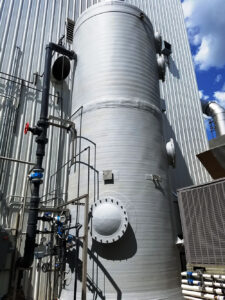
These scrubbers provide an integrated solution for contaminant removal, making them a cost-effective and space-saving choice for air pollution control.
We customize and tailor each scrubber to meet the specific application requirements of various industrial facilities. Design flexibility makes this type of scrubber a versatile option.
Packed tower scrubbers are limited to around 60,000 cfm, Venturi scrubbers have a limit of 76,000 cfm and an ImpinJet scrubber is limited to 76,950 cfm.
Advantages of Fiberglass Reinforced Plastic
FRP wet scrubbers can be fabricated using different high-performance resins depending on the final application. Resin selection is typically based on the specific requirements and conditions of the intended industrial process or the gas stream that requires a wet scrubber. The resin can provide chemical and temperature resistance. UV resistance is provided by a topcoat and the fiberglass within the composite supplies durability.
Click images to view larger
FRP wet scrubbers offer various features and benefits such as:
- Corrosion resistance: The non-reactive nature of FRP offers superior corrosion resistance, allowing exposure to and management of a wide range of corrosive and hazardous chemicals found in various industrial processes. This resistance helps prevent damage and deterioration for long-term operation without frequent replacements.
- Weight: The fiberglass reinforced polymers are significantly lighter than a comparable scrubber fabricated of alternative materials such as metals. This eases transportation, installation, and handling during maintenance. In addition, a metal scrubber might require more extensive support structures because of the weight.
- Cost-effectiveness: The cost of materials and construction for FRP wet scrubbers offer a budget-conscious option while providing excellent performance in corrosive, wet environments.
- Dimensional stability: Fiberglass reinforcement helps maintain the dimensional stability of the scrubbers. This stability makes the scrubbers less prone to warping, distortion, or expansion and contraction due to temperature changes for longer-lasting, more consistent performance.
- Thermal insulation: The composite nature of an FRP wet scrubber offers some degree of thermal insulation compared to conductive materials.
- Customization: The composite material means an FRP wet scrubber is easily customized according to shape and size. This offers design flexibility for customization to fit specific applications.
- UV resistance: FRP scrubbers are inherently UV-resistant, which makes a wet scrubber fabricated of FRP suitable for outdoor applications without degrading under exposure to sunlight.
- Maintenance: FRP scrubbers receive a topcoat prior to installation. This helps maintain the scrubber’s surface, to prevent rust and resist contaminant buildup.
- Capture efficiency: FRP scrubbers can achieve high capture efficiencies for both gaseous and particulate contaminants.
FRP Scrubber Limitations:
- Gas temperature: FRP scrubbers are generally limited to an inlet gas temperature of 220°F, although upstream close-coupled evaporative quenches can be added to accommodate greater temperatures.
- Gas pressure: FRP scrubbers are generally limited to 1 psig, or 27.7 inches of water, pressure or vacuum, although design considerations can be made to accommodate pressure conditions from full vacuum to 15 psig.
- Erosion: FRP scrubbers may experience erosion and accelerated degradation when exposed to abrasive particulates.


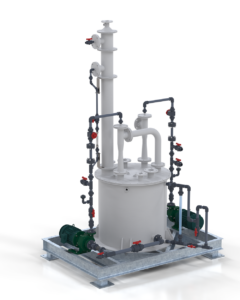
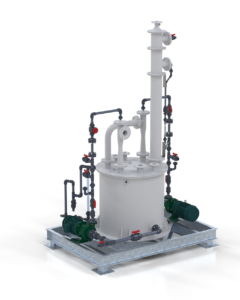
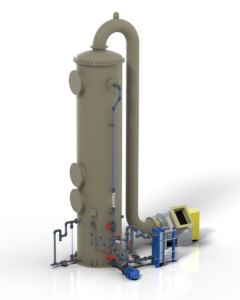
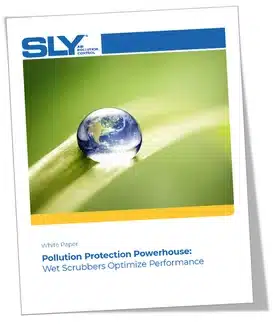 Companies that fail to comply with air quality regulations can face severe consequences including fines, legal action and reputational damage. Wet scrubbers, particularly those fabricated of fiberglass-reinforced plastic (FRP), offer an efficient and cost-effective solution for controlling industrial emissions.
Companies that fail to comply with air quality regulations can face severe consequences including fines, legal action and reputational damage. Wet scrubbers, particularly those fabricated of fiberglass-reinforced plastic (FRP), offer an efficient and cost-effective solution for controlling industrial emissions.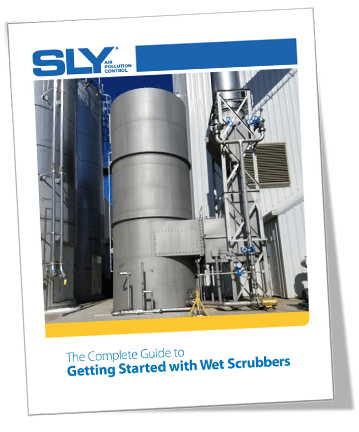 The first step to getting the best wet scrubbing system possible is knowing what your application needs. This resource details everything you need to know about wet scrubbers and how to make the right selection for your facility.
The first step to getting the best wet scrubbing system possible is knowing what your application needs. This resource details everything you need to know about wet scrubbers and how to make the right selection for your facility. 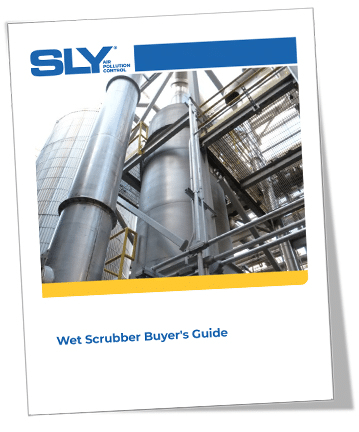 Wet scrubbers can take on tough air pollution control challenges that dry dust collectors can’t. In fact, certain scenarios all but demand a wet scrubber.
But how you do decide what wet scrubber is best for you and what supplier to use?
Wet scrubbers can take on tough air pollution control challenges that dry dust collectors can’t. In fact, certain scenarios all but demand a wet scrubber.
But how you do decide what wet scrubber is best for you and what supplier to use?